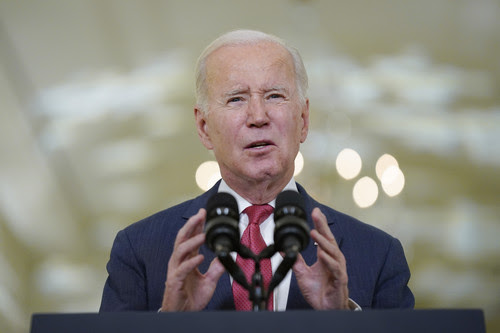The Republicans won a narrow majority in the House of Representatives in 2022—aided by gerrymandering and new laws that made it harder to vote—but they remain unable to come together to elect a speaker. In three ballots yesterday, Republican leader Kevin McCarthy (R-CA) could not muster a majority of the House to back him, as a group of 20 far-right Republicans are backing their own choices. The saga continued today with three more ballots; McCarthy still came up short.
In contrast, the Democrats have consistently given minority leader Hakeem Jeffries of New York 212 votes, more votes than McCarthy received but not a majority of the body. When former Speaker Nancy Pelosi nominated Jeffries yesterday, she blew him a kiss and the caucus rose up in a standing ovation.
Because it is still unorganized, the House technically has no members. No one is sworn in, and so they cannot perform their official duties or hire staff. About 70 new members brought their families to Washington, D.C., to watch their swearing in, and the extra days as the speakership contest drags on are becoming hard to manage.
The chaos suggests that Republican leadership does not have the skills it needs to govern. Leaders often have to negotiate in order to take power—Nancy Pelosi had to bring together a number of factions to win the speakership in 2019—but since 1923 those negotiations have been completed before the start of voting.
Just weeks ago, McCarthy and his supporters were furious at Senate Republicans for negotiating with their Democratic colleagues to pass the omnibus bill to fund the government, insisting they could do a better job. Now they can’t even agree on a speaker. “Thank God they weren’t in the majority on January 6,” Pelosi told reporters, “because that was the day you had to be organized to stave off what was happening, to save our democracy, to certify the election of the president.”
One story here is about competence. Josh Marshall of Talking Points Memo points out that Pelosi ran the House with virtually the same margin the Republicans have now and yet managed to hold her caucus together tightly enough to pass a slate of legislation that rivaled those of the Great Society and the New Deal. McCarthy can’t even organize the House, leaving the United States without a functioning Congress for the first time in a hundred years.
But there is a larger story here about the destruction of the traditional Republican Party over the past forty years. In those years, a party that believed the government had a role to play in leveling the country’s economic and racial playing fields was captured by a reactionary right wing determined to uproot any such government action. When voters—including Republicans—continued to support business regulation, a basic social safety net, and civil rights laws, the logical outcome of opposition to such measures was war on the government itself.
That war is not limited to the 20 far-right Republicans refusing to elect McCarthy speaker. Pundits note that those 20 have supported former president Trump’s positions, particularly the Big Lie that the 2020 election was stolen. They also worked to overturn the 2020 election, challenging the electors from a number of states. But 139 Republicans, including McCarthy himself, voted in 2021 to challenge electors from a number of states and went on to embrace the Big Lie, and McCarthy’s staunchest supporter is extremist Marjorie Taylor Greene of Georgia.
And today, more than 60 prominent right-wing figures, from President Ronald Reagan’s attorney general Edwin Meese III to Trump lawyers Cleta Mitchell and John Eastman, who were both instrumental in the effort to overturn Biden’s election in 2020, and Justice Clarence Thomas’s wife Ginni Thomas, who also participated in that effort, declared themselves “disgusted with the business-as-usual, self-interested governance in Washington.” They declared their support for the 20.
The roots of today’s Republican worldview lie in the Reagan Revolution of 1980.
Reagan and his allies sought to dismantle the regulation of business and the social welfare state that cost tax dollars, but they recognized those policies were popular. So they fell back on an old Reconstruction era trope, arguing that social welfare programs and regulation were a form of socialism because they cost tax dollars that were paid primarily by white men while their benefits went to poor Americans, primarily Black people or people of color. In that formula, first articulated by former Confederates after the Civil War, minority voting was a form of socialism that would destroy America.
When Reagan used this argument, he emphasized its idea of economic individualism over its racism, but that racism was definitely there, and many of his supporters heard it. When he stood about seven miles from Philadelphia, Mississippi, where Ku Klux Klan members had murdered civil rights workers James Chaney, Andrew Goodman, and Michael Schwerner just 16 years before as they tried to register Black people to vote, and said “I believe in states’ rights,” the racist wing of the old Democratic Party knew what he meant and voted for him.
In the years since, party leaders cut taxes and deregulated business while rallying voters with warnings that government policies that regulated business, provided a social safety net, or protected civil rights were socialism that redistributed white tax dollars to minorities. In the 1990s, under the leadership of House speaker Newt Gingrich, Chamber of Commerce lawyer Grover Norquist, and talk radio host Rush Limbaugh, the party purged from its ranks traditional Republicans, replacing them with ideological fellow travelers.
As their policies threatened to lose voters by concentrating wealth upward and hollowing out the middle class, Republicans increasingly warned that minority voters wanted socialism and were destroying the nation to get it. Trump rode that narrative to power, and now tearing down the current government is the idea that drives the Republican base.
Just last night, in his apparent realization that the party is moving beyond him, Trump launched a new attack on Black Georgia election worker Ruby Freeman, falsely accusing her once again of delivering suitcases of fraudulent ballots in the 2020 presidential election to steal victory from him. Trump said he is fighting “the evils and treachery of the Radical Left monsters who want to see America die.”
That Republicans now have a wing openly determined to destroy the federal government is not a function of a few outliers who have wormed their way into Congress; it is the logical outcome of this worldview. Lawmakers like Matt Gaetz (R-FL) and Lauren Boebert (R-CO) are clearly enjoying the power they are currently wielding, but their larger project is the one the party has advertised since they were children: stopping the government from any of the actions it has called “Marxist” or “socialist,” burning it all down to make white Americans free.
Destruction doesn’t take skill at governance; it only requires obstruction. The 20 are good at that.
But a new era is pushing the Reagan era aside. Plenty of Republicans who want to deregulate business and cut taxes recognize that it is our democratic government and the rule of law that protects their investments, and that maintaining the government will take basic laws and the skills to negotiate and pass them.
At the same time, after two years of Democratic control, Americans have seen that government can work for them, and they appear to like the new laws that have created jobs—including in manufacturing—and invested in social services and are rebuilding infrastructure. Republicans who want to get reelected are moving away from the extremists to take credit for the laws passed under the Democrats. Just today, Senate minority leader Mitch McConnell of Kentucky, Ohio governor Mike DeWine, and former Ohio senator Rob Portman—all Republicans—joined President Joe Biden, Democratic governor of Kentucky Andy Beshear, and Democratic Ohio senator Sherrod Brown in Covington, Kentucky, to visit the Brent Spence Bridge between Covington and Cincinnati, Ohio. The bridge is on one of the country’s busiest freight corridors and is being rebuilt with money from the bipartisan infrastructure law passed in 2021.
In Ohio yesterday, Jason Stephens, a Republican promising to stop far-right policies, joined with Democrats to snatch the speaker’s chair from a far-right Republican who focused on religion and opposing abortion rights and who believed he had sewn up the necessary votes in his party. A Democratic state representative told Morgan Trau of ABC News, “Speaker Stephens led a coalition of moderate lawmakers from across the aisle, who will now focus on delivering the common sense solutions that Ohioans sent us here to deliver…. Now we can work on investing in our communities, on public education and workforce development.”
—
Notes:

https://www.vox.com/2021/1/6/
https://www.nytimes.com/
https://www.cnbc.com/2019/01/



https://www.cnn.com/2023/01/
https://




















